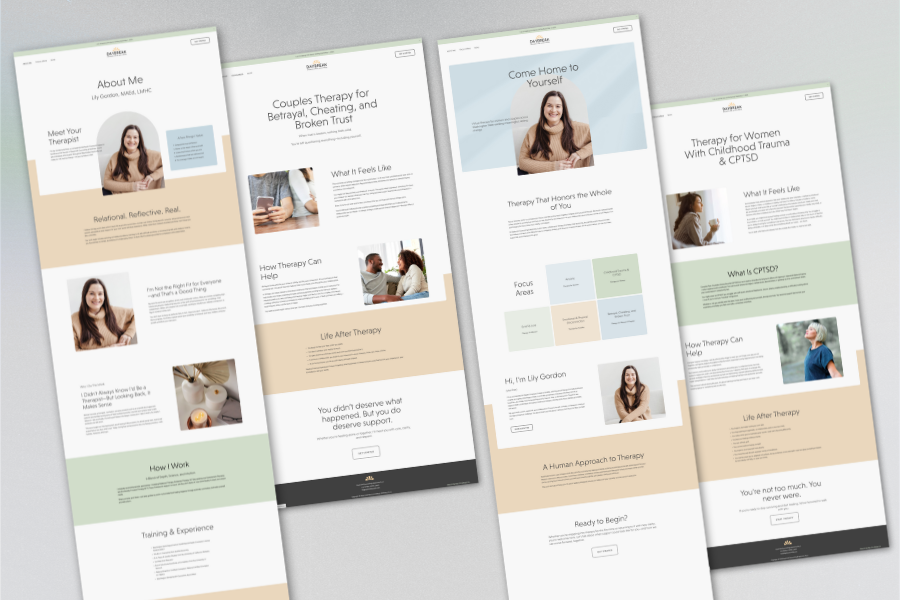Does Your Website Pass the One Question Test?
Does Your Website Pass the One Question Test?
As a therapist, your website is an essential tool for attracting clients and communicating your services. And nobody knows your industry as well as you do. You can rattle off your services, ideal clients, and the benefits of your services without hesitation. You live and breathe your business, so you're the best person to write your website copy.
Aren't you?
Well, it depends.
Can you leave the jargon at the door?
Jargon is special words or expressions used by a particular profession or group and is difficult for others to understand.
Using industry jargon and complex language can alienate potential clients and hinder their connection to your practice. If your marketing content leaves people scratching their heads, potential clients won't feel a connection to you.
In this guide, we'll explore the Why and the How of writing jargon-free, client-focused website copy. I’ll provide examples to help you effectively communicate with your audience.
The One Question Test
Before launching your website, review the copy and ask yourself: "Would my client say this?" This simple question serves as a litmus test to ensure your language is easily understood and resonates with your potential clients. Would they use words like "avoidant attachment" or "comorbidity?" No, probably not. By keeping your copy client-focused, you can establish a genuine connection and convey your services in a relatable manner.
Examples of What Not to Write
Let's dissect a few examples of website copy that are riddled with jargon, cliches, and vague language:
The most basic goal for most clients is a return to previous functionality. Other goals include development of coping skills, resolving ambivalence, establishing a healthy thought pattern, increasing assertive communication and reducing anxiety.
I am committed to work with you utilizing a Christian, strength-based approach to provide growth and positive change. I am passionate about empowering individuals with the tools they need to improve their overall quality life.
Psychotherapy is highly effective in assisting individuals making cognitive and behavioral changes that can be significant in improving their mood, social relationships, level of satisfaction at work/school, and self-care. My emphasis is in Cognitive Behavioral Therapy, Motivational Interviewing, Structural Family Therapy, and Spiritual Counseling.
These examples not only overwhelm readers with technical terminology but also lack authenticity and fail to address clients' needs in a relatable way. It all sounds a bit pretentious, doesn't it?
If you’re wondering… yes, these are taken from real therapy practice websites I found online.
Examples of Jargon-Free Website Copy
Now, let's examine three examples of website copy that effectively engage potential clients without relying on industry jargon:
Example 1:
If you're feeling down a lot, worried about the future, or having trouble sleeping, you're in the right place. Maybe your relationships aren't feeling good or steady, or you have a habit you can't stop, or a pattern that's bothering you. Maybe something from the past still bothers you, or you just want to understand yourself better. No matter why you're here, you want to make a change, and I'm here to help.
Example 2:
Living with anxiety is rough, right? It's like your brain won't stop running in circles, you can't catch a break when it comes to sleep, and your heart feels like it's doing a marathon in your chest. You wish you could just hit pause on it all, but it feels like an impossible task. Anxiety doesn't just hang out in one corner of your life; it's everywhere, from work to home to school to your social life. You've tried every trick in the book, but nothing seems to put a dent in it. You start to wonder if it's ever going to ease up. All you really want is some peace and stability to reclaim your life from the clutches of anxiety. Imagine finally feeling in control—now that's the dream!
Example 3:
Alright, let's get real. You're not feeling great. You're jittery, on edge, and sometimes feel downright blue. It's like you're stuck in a rut. And your love life? Well, let's just say it's seen better days. You're not showing up how you want to with the people who matter most to you. Instead, you're feeling frustrated and defensive, and every criticism hits you like a ton of bricks. It's time to face the music and be honest: you need a helping hand. Someone who's got your back, someone to chat with who isn't your family, buddy, or coworker.
These examples speak directly to clients' experiences and emotions, creating a sense of empathy and understanding.
Exercise: Get Feedback on Your Website Copy
Now that you've crafted your website copy with clarity and simplicity in mind, it's time to put it to the test. Invite a friend or family member who doesn't work in mental health to read through your copy. If you have access to a middle school-aged person, even better, as their feedback can offer valuable insights into the readability of your content.
Ask them to circle any words or phrases they don't understand or don’t feel connected to. Remember, the goal is to ensure that your copy is easily comprehensible to a broad audience, so don't be discouraged if there are areas that need clarification.
It's essential to note that there are exceptions. If your target audience consists of therapists or academics who may be familiar with specialized terminology, it's acceptable to include these terms as long as they serve a specific purpose and enhance the clarity of your message.
Once you've received feedback, take the time to review the circled words and phrases. Consider whether they are essential to conveying your message or if there are simpler alternatives that could be used instead. Remember, the ultimate aim is to create copy that resonates with your audience and fosters genuine connections.
By applying the One Question Test and focusing on client-centric language, you can create website copy that resonates with your audience and effectively communicates your services. By incorporating feedback from individuals outside the mental health field, you can refine your website copy to ensure it effectively communicates your services to a diverse audience. Remember to keep it simple, relatable, and authentic to foster genuine connections with potential clients.
































